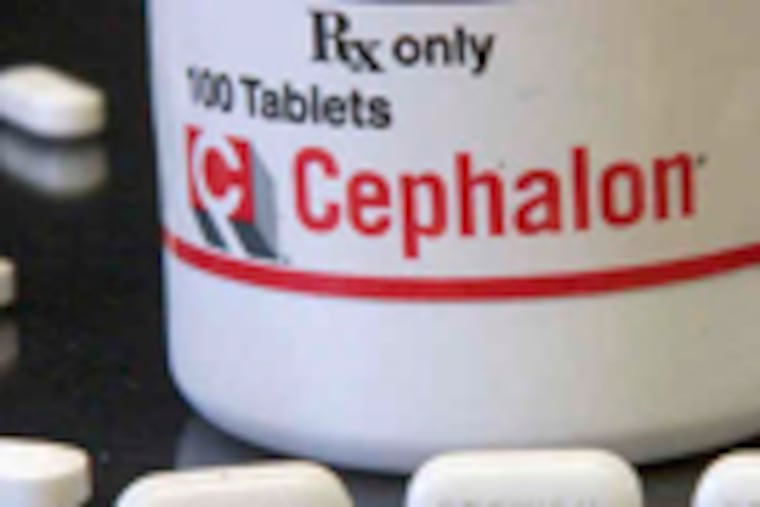PhillyDeals: Cephalon on receiving end of hostile bid
The hunter is now prey. Cephalon, the Frazer drugmaker that has been trying to grow by swallowing smaller firms, is stalling on its answer to Tuesday's hostile, urgent $5.7 billion takeover offer from Canadian Valeant Pharmaceuticals International.

The hunter is now prey.
Cephalon, the Frazer drugmaker that has been trying to grow by swallowing smaller firms, is stalling on its answer to Tuesday's hostile, urgent $5.7 billion takeover offer from Canadian Valeant Pharmaceuticals International.
Valeant, which makes generic drugs, has less than half Cephalon's sales and workforce. Cephalon employs 4,000, including 1,000 at its Frazer offices and West Chester labs. Valeant says it can cut Cephalon's yearly expenses by one-quarter. Company spokespeople didn't return calls asking how many Cephalon employees Valeant wants to fire.
But Valeant, trading on Canada's inflated stock market, is worth more than Cephalon, so it's in a position to buy - though the deal would cost so much that Moody's and Standard & Poor's
threatened Wednesday to cut Valeant's credit ratings if a sale were to go through.
What may be bad for bondholders is intoxicating
for stock speculators: Both companies' shares rose sharply on hopes the bid would attract other buyers. Years of mergers by drug companies trying to boost sales and cut costs have enriched bosses, bankers, and lawyers, while leaving thousands of workers jobless.
Letters released by Cephalon trace the pursuit of Cephalon boss Kevin Buchi by Valeant boss J. Michael Pearson.
The pair met March 3. In a March 18 follow-up letter, Pearson said he was "very enthusiastic" about buying Cephalon with his "extremely attractive" offer.
But in a meeting that day, Buchi told Pearson the Cephalon board would reject Valeant's offer as too low.
"I was extremely disappointed" by Cephalon's rush the following week to buy additional small drugmakers, Pearson told Buchi in a letter Friday. (Since talks with Valeant began, Cephalon has announced plans to buy ChemGenex and Chester County-based Gemin X.) Pearson threatened to cut his price, complaining that Cephalon's own buying campaign "has reduced the value-creation potential."
As flagship drug Provigil approaches patent expiration, Cephalon is becoming "a less-attractive acquisition," Pearson warned Tuesday.
In a reply the next day, Buchi offered to "correct Valeant's apparent misunderstanding" and said the Cephalon board would meet next week to review Valeant's offer.
That left Pearson desperate enough to go over Buchi's head and appeal to Cephalon shareholders and the public.
In a meeting with investors Wednesday, Pearson reversed gear on one key point: Instead of cutting his price, he said, he'd consider a "bump" in his Cephalon offer. He also threatened to run insurgent candidates to unseat Cephalon's board with Valeant nominees.
Pearson mocked Cephalon's "strategy based on luck," its "risky pipeline" of future drugs, and its past "failed" deals, which Pearson said "demonstrate that Valeant could be a natural owner."
Buchi didn't roll. It's "inadvisable" to rush a decision, Cephalon spokesman Fritz Bittenbender told me. The company's board still plans to review Valeant's offer next week.
Cephalon shares ($75.44) topped Valeant's $73 offer Wednesday, suggesting some investors expected more and richer bids were in the works.
Hard-bargaining
Kimberly-Clark, the Texas toilet-paper and diaper maker, is using the threat of plant closings and Chinese competition to wring concessions from workers at its U.S. plants, including its Welsh Street works in Chester, which employs around 800.
"Mill management and union leadership are currently working on a cost-improvement plan and will continue to do so for many months," company spokeswoman Kay Jackson told me. "We are constantly looking at ways to improve this mill's effectiveness and competitiveness."
The company said in January that it planned to close four or five plants to save hundreds of millions of dollars a year. Chester "is currently not partof our recently announced tissue-restructuring plan," Jackson said, "and no decision has been made to close the facility."
As the two sides meet this week, the mill is shuttered. Jackson called it "a major site-maintenance outage." She said it should be back up next week. Union leaders didn't return calls.